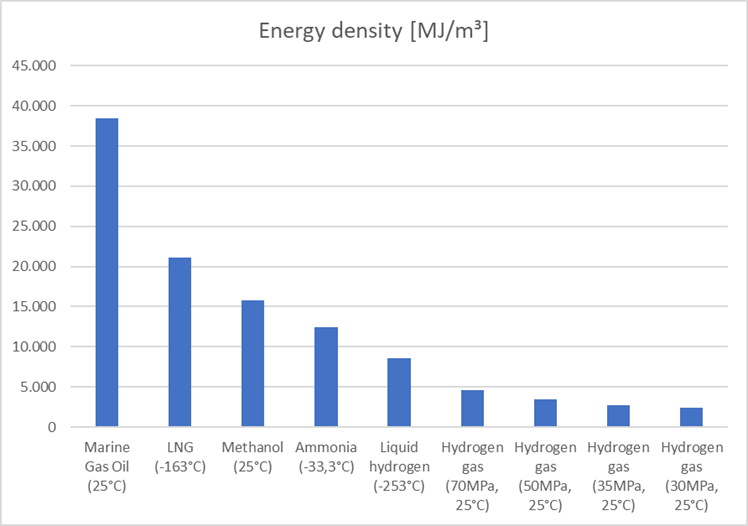VOLUMETRIC ENERGY DENSITY
With exhaust gas emissions being monitored closely and alternative fuels being on the rise, ship owners and shipping companies need to make a few choices before they order their next vessel. Do I go for LNG, hydrogen, methanol or maybe ammonia? When it comes to fuel storage, the volumetric energy density is a factor to take in consideration.
WHAT IS ENERGY DENSITY?
Each fuel provides a certain amount of energy when combusting a certain quantity, the amount of energy per unit of weight is called the lower heating value (LHV) which is measured in MJ/kg. Each fuel also has a density which is measured in kg/m³. By multiplying these two numbers we get the energy density measured in MJ/m³. The energy density tells you how much storage volume you need to have available on your ship in order to get the amount of energy required to propel your vessel.
Energy density = LHV x ρ
SO WHICH FUEL HAS THE BEST ENERGY DENSITY?
It should not come to you as a surprise that Marine Gas Oil (MGO) has the most favorable energy density, we have been using it for the last couple of decades. But with this option out of the question what is the second best option? In the chart below we included today’s most promising alternative fuels for the maritime sector (additional volume for containment e.g. insulation for cryogenic storage and cofferdams for methanol is not included).

When looking on the chart it becomes clear that LNG is the best second choice when it comes to energy density however LNG requires containment at -163 degrees Celsius which is reflected in the CAPEX of the fuel gas supply system to be installed on your ship. If you want lower CAPEX with a fuel that can be bunkered at normal temperatures methanol is a good option, however keep in mind that when using methanol you need the double amount of fuel storage space to get the same energy as obtained from MGO. Although the use of hydrogen sounds attractive because it will give you zero emissions, keep in mind that it will take up around 4,5 to 16 times as much space as marine gas oil. We therefore often advise our clients that hydrogen is more suitable for low energy requirement over short sailing distances.

